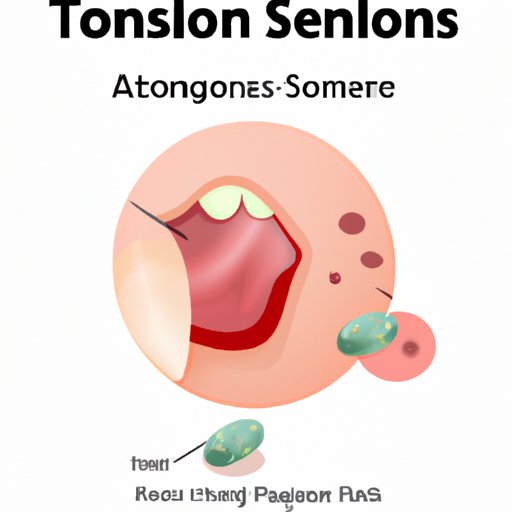I. Introduction
Tonsil stones are small, hard, yellow or white lumps that form in the pockets of the tonsils. They can cause bad breath, sore throat, and difficulty swallowing, among other symptoms. If you’re wondering what causes tonsil stones and how to get rid of them, this article will provide you with all the information you need.
II. Anatomy and Causes of Tonsil Stones
The tonsils are two small, oval-shaped structures located at the back of the throat. They play an essential role in preventing infection by trapping bacteria and other harmful particles before they reach the body’s other organs. The tonsils have crevices, known as crypts, which can trap bacteria, food particles, and dead cells, leading to the formation of tonsil stones.
Various factors contribute to the development of tonsil stones. Poor oral hygiene, chronic inflammation of the tonsils, and post-nasal drip are some of the primary causes. People who have larger tonsils or deep crypts are also more likely to develop tonsil stones.
III. Symptoms and Diagnosis of Tonsil Stones
Bad breath is one of the most common symptoms of tonsil stones. The sulfur compounds produced by bacteria in the mouth can cause an unpleasant odor that can be difficult to get rid of with brushing or mouthwash. Other symptoms may include sore throat, ear pain, difficulty swallowing, and coughing up small stones.
A doctor can diagnose tonsil stones through a physical exam, imaging tests such as CT scans, and throat cultures. They may also use a special tool to remove the tonsil stones in severe cases to relieve symptoms.
IV. Treatment Options for Tonsil Stones
There are several treatment options available for tonsil stones, depending on the severity of the symptoms and the underlying cause. If the tonsil stones are caused by a bacterial infection, antibiotics may be prescribed. Removing the tonsils surgically, through a tonsillectomy, is also an effective way to eliminate tonsil stones permanently. However, this option is usually reserved for extreme cases. Saltwater gargles, probiotics, and other natural remedies may provide some relief from symptoms, but their effectiveness remains largely unproven.
V. Tips and Strategies for Preventing Tonsil Stones
Good oral hygiene can go a long way in preventing tonsil stones from forming. Brushing and flossing regularly can help remove food particles and bacteria from the mouth, reducing the risk of tonsil stones. Certain foods, such as dairy products and sugar, can also contribute to tonsil stone formation, so limiting their intake may be helpful. Lastly, regularly cleaning the tongue and using a mouthwash may also help prevent tonsil stones.
VI. Conclusion
Tonsil stones are a common condition that can cause discomfort and embarrassment for those who suffer from them. However, with proper prevention and treatment, it’s possible to manage and eliminate tonsil stones effectively. If you think you may have tonsil stones, consult with a doctor to determine the best course of action for your symptoms.
